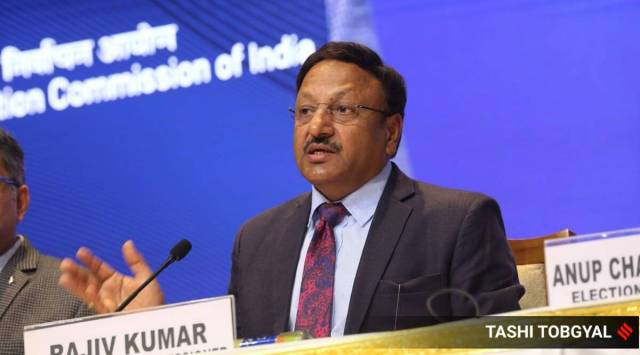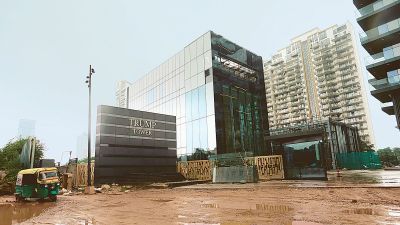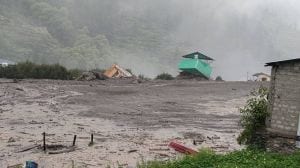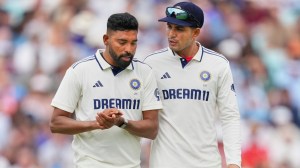Gujarat election dates are out: Voting to be held on Dec 1 & 5, counting Dec 8
Voting in 89 out of the 182 seats would be held in the first phase on December 1, while the remaining 93 would have polling on December 5
 Chief Election Commissioner Rajiv Kumar addresses a press conference on the schedule of the Gujarat Assembly polls in the presence of the Election Commissioner Anup Chandra Pandey at the Akashvani Bhavan in New Delhi on Thursday. (Express Photo by Tashi Tobgyal)
Chief Election Commissioner Rajiv Kumar addresses a press conference on the schedule of the Gujarat Assembly polls in the presence of the Election Commissioner Anup Chandra Pandey at the Akashvani Bhavan in New Delhi on Thursday. (Express Photo by Tashi Tobgyal)The Election Commission on Thursday announced the much-awaited schedule for the Gujarat Assembly polls, with voting on December 1 and December 5 and counting on December 8, the same as for the November 12 Himachal Pradesh elections.
Voting in 89 out of the 182 seats would be held in the first phase on December 1, while the remaining 93 would have polling on December 5. Nominations for the two phases would be from November 5 to November 14 and November 10 to November 17 for the first and second respectively. Morbi is among the districts that will go to the polls in the first phase.
Facing questions from Opposition parties about its decision to announce the Himachal Pradesh and Gujarat elections separately, with the former having been announced on October 14, the EC sought to defend its impartiality. Chief Election Commissioner Rajiv Kumar said many factors had gone into the timing of the announcement, including the term of the Gujarat Assembly that will end on February 18, 2023, availability of security forces, the weather, the tradition of counting of votes for both states on the same day and the number of days the Model Code of Conduct would be applicable. He said the polls were announced 110 days before the end of the term of the assembly. In 2017 as well, the EC had announced the two polls separately.
Asked to respond to one of the allegations that the announcement was delayed to give Prime Minister Narendra Modi time to visit the state, Kumar reiterated that there were multiple factors. “Keep this also in mind that a tragic incident just occurred there. Yesterday also there was state mourning there,” he said, referring to the bridge collapse in Morbi on October 30 that left 135 people dead.
Addressing questions on the independence of the EC, Kumar said “actions and outcomes speak louder than words” and that questioning the results of elections was an insult to voters.
“In a large number of elections, it has been shown that those who were critical of the EC have got surprising results. There are instances where we have received lengthy letters before the elections saying the ‘EVMs are bad and need to be changed’. The very EVMs then lead the same party to victory and the questioning ends,” he said.
Using a cricketing metaphor, the CEC said sometimes the losing side blames the umpire. “Here, we don’t have a third umpire where we can see the ball-by-ball play. But, when the results are announced, it is a testimony of the impartiality of the EC.”
Meanwhile, the CEC said the commission had received comments from political parties on its proposal to amend the Model Code of Conduct to include disclosure of financial implications of promises made in manifestos. He said the EC would respond at the “right moment”. Most political parties had questioned the EC’s powers to regulate the promises made during election campaigns.
Asked about the criticism, the CEC said: “World over you have a large number of examples in democracies where due to populism, there are serious macro-economic constraints and stresses visible. I can give you a large number of examples but it’s not safe. The commission’s basic principle is that political parties and all stakeholders have a responsibility as well as a right. Parties and candidates have the right to promise whatever they want to voters.”
But, he added, that voters had a right to be informed about the promises made by parties. “The commission is working on basic principle of disclosures. Let the voter decide.”












